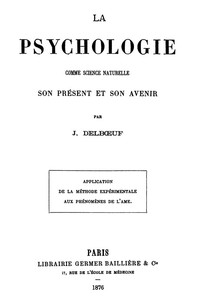| Author |
Delboeuf, Joseph-Remi-Leopold, 1831-1896 |
| Title |
La psychologie comme science naturelle, son présent et son avenir
Application de la méthode expérimentale aux phénomènes de l'âme
|
| Credits |
Produced by Madeleine Fournier. Images provided by The Internet Archive.
|
| Summary |
"La psychologie comme science naturelle, son présent et son avenir" by J. Delbœuf is a scientific publication written in the late 19th century. The work explores the relationship between the mind and body, advocating for a systematic and experimental approach to understanding psychological phenomena. It delves into the origins of knowledge, the distinction between materialism and spiritualism, and the necessity of integrating various scientific fields in the study of psychology. The opening of the book introduces the fundamental questions surrounding the nature of the soul and its connection to the body. Delbœuf emphasizes the importance of self-knowledge and the need for a comprehensive approach to psychological investigation, which combines insights from multiple disciplines. He critiques existing philosophical frameworks, particularly materialism and spiritualism, and discusses how both fail to adequately address the complexities of human experience. Furthermore, he underlines the significance of understanding how knowledge is formed, advocating for an empirical method that considers both internal and external sources of experience. (This is an automatically generated summary.)
|
| Language |
French |
| LoC Class |
BF: Philosophy, Psychology, Religion: Psychology, Philosophy, Psychoanalysis
|
| Subject |
Soul
|
| Subject |
Psychology
|
| Subject |
Human experimentation in psychology
|
| Category |
Text |
| EBook-No. |
55879 |
| Release Date |
Nov 2, 2017 |
| Most Recently Updated |
Jun 25, 2020 |
| Copyright Status |
Public domain in the USA. |
| Downloads |
93 downloads in the last 30 days. |
|
Project Gutenberg eBooks are always free!
|

